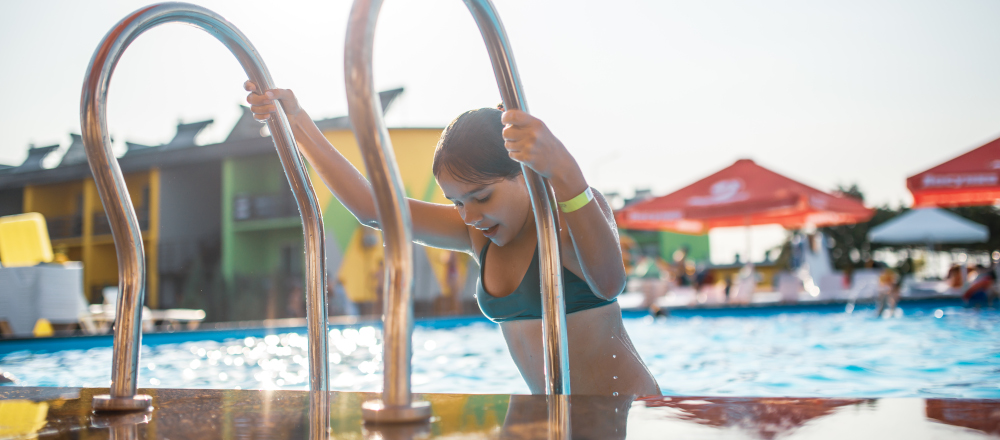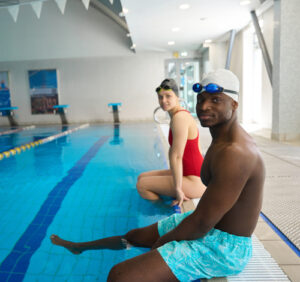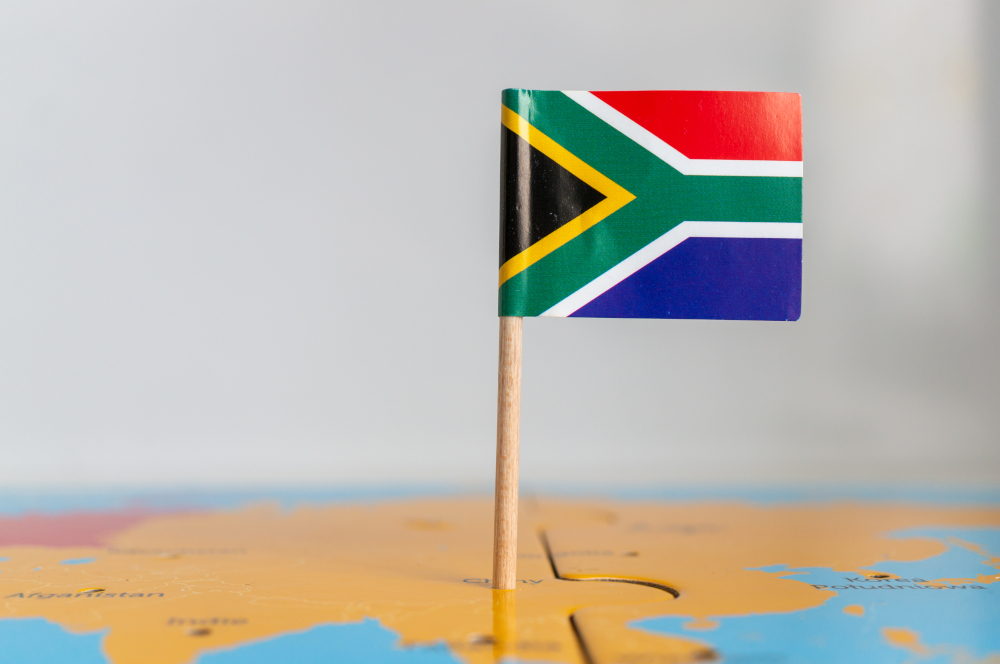
Salt, Skin, Silence, The Private Lives of Swimmers in Public Pools
The gates open just after seven, even when no one’s queuing. A man in overalls sweeps the paving before the first splash, dragging a wet broom in wide arcs like he’s clearing more than dirt. The pool lies flat and still, holding the early morning light on its surface, a silent promise of escape. It looks the same in every suburb, township, or holiday town. The rectangular blue. The white paint chipping at the edges. The chipped tiles. The silence that holds just before the water’s surface breaks.
You come to a public pool for the water, but you stay for what it doesn’t ask of you. No need to explain where you were yesterday. No questions about your job, your rent, your marriage, or the texts you didn’t answer. In the pool, your body is no one’s business. And so you slip into the water with something like relief. Not joy exactly, joy is loud, joy needs witnesses. This is quieter. Like folding into a version of yourself that makes sense.
There are the regulars. The woman with the braided cap who swims lengths like clockwork, always in the same lane, never looking up. The boy who comes alone, towel over shoulder, no one dropping him off, no one waiting at the gate. He dives in and stays under longer than he should, like the water understands him better than the air. There’s the man who never swims but sits in the same spot every day, book in hand, eyes always drifting. He’s not reading. He’s remembering.
Swimmers carry things with them into the water. Not in their hands. In their backs. In their breath. You can’t tell by watching, but you can feel it in the way they move. The woman doing breaststroke with too much force, like she’s pushing something down. The girl floating on her back, blinking up at the sky like it owes her an answer. The old man with the stiff shoulders, doing a slow crawl as if time isn’t chasing him anymore.
The water doesn’t offer solutions. But it holds things without demanding shape. Regret, shame, small victories, grief. All of it gets softened at the edges. And when you’re underwater, even your own voice fades. That’s what draws people in, the silence. It’s not like the quiet of an empty room or a switched-off phone. It’s a silence that holds you. That lets you breathe out without consequence. That forgives.
There are moments when the pool gets loud. Kids cannonballing at the deep end. Radios playing nearby. Friends shouting across the lanes. But even then, there’s a kind of isolation within it. You stay in your lane. You look down. You listen to the bubbles leaving your mouth. You think thoughts you’ve been avoiding all week. You stretch, kick, glide, return. No one needs to know what you’re thinking. That’s the contract here, be present, but not visible. Move, but don’t declare. Heal, if you must, but quietly.
 People don’t talk much at the pool. Not real talking. Just nods. Half-smiles. A mumbled “You done with this lane?” But occasionally, you hear something true. A mother teaching her daughter to swim, whispering, “I’m right here, don’t worry.” A teenager telling his friend, “Don’t look now, but he’s watching you again.” A man muttering to himself, “Three more laps, then I’ll call her.” Little truths left behind like towels on the fence, drying in the sun.
People don’t talk much at the pool. Not real talking. Just nods. Half-smiles. A mumbled “You done with this lane?” But occasionally, you hear something true. A mother teaching her daughter to swim, whispering, “I’m right here, don’t worry.” A teenager telling his friend, “Don’t look now, but he’s watching you again.” A man muttering to himself, “Three more laps, then I’ll call her.” Little truths left behind like towels on the fence, drying in the sun.
The changing rooms carry their own truths. Wet tiles. Fogged mirrors. Scars that show more easily without clothes. A girl covers a bruise. A boy avoids his own reflection. Someone cries softly, not because of pain, but because the water let them feel something they’d locked away. You see them sit, half-dressed, elbows on knees, trying to find the will to go back out into the noise. Eventually, they do.
By midday, the sun burns the edge of the pool. Lifeguards lean into shade. The water grows warmer, more crowded. The morning regulars are gone, replaced by chaos, laughter, and the shrieks of childhood. But the silence lingers. It lives at the bottom. Beneath the noise. It waits for the ones who return in the late afternoon, the ones who never really come to swim for fitness, or fun, or even escape. They come for a kind of stillness. A ritual. A way to remain intact.
Sometimes people leave without drying off. They walk home in damp clothes, the salt drying on their skin like a quiet badge. Sometimes they carry that wetness into taxis, into shops, into conversations they don’t want to have. It reminds them they were somewhere that didn’t need them to perform. Somewhere that just let them be.
Not everyone at the pool is wounded. But everyone brings something tender. A memory. A longing. A question they don’t yet know how to ask. And somehow, the water receives it all. With no instructions. No lessons. Just an open surface and a hidden depth.
Tomorrow, the gates will open again. The same man will sweep the paving. The pool will wait. Flat. Silent. Ready. Because somewhere out there, someone is already packing their towel. Already planning to show up. Not for the laps. Not for the tan. But for the kind of privacy only public spaces allow. The kind where salt, skin, and silence do their work while the world keeps moving outside.




